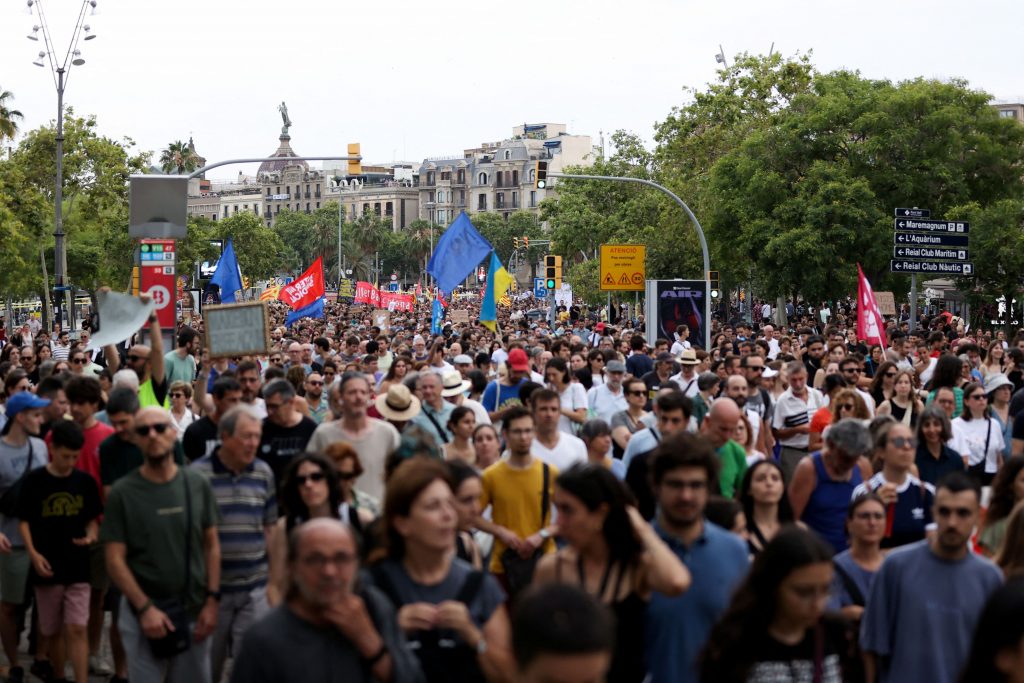BARCELONA—Tourists to popular European destinations have encountered signs that locals wish they’d go elsewhere.
Nearly 3,000 protesters marched through La Rambla, this city’s tourism epicenter, last week. They sprayed people with water from colorful squirt guns. Videos of the event went viral on social media.
In the wake of such visible protests, travel agents and hospitality companies say there haven’t been mass cancellations so far. But travelers headed to Europe say they are now thinking harder about where to go. And visitors who were in Barcelona and other cities say that the protests and increased anti-tourist graffiti are hard to ignore.
“We love Barcelona, but if they’re looking to limit tourism, it’s definitely a consideration for us going forward,” says Val Gui , a 36-year-old executive from Boston who was in the city last week with his family.
Gui, who has an eight-month-old daughter, says he empathizes with locals. He lived in San Francisco as that city grew more expensive.
While in Barcelona, he says he received friendly service from restaurant staffers and business owners who appreciated his family’s attempts to speak Spanish. He also felt somewhat unwelcome due to the amount of graffiti critical of travelers like him.

Protesters shoot water from water guns at tourists during a protest against mass tourism in Barcelona, Spain, July 6, 2024. The Catalan capital received more than 12 million tourists in 2023 and expects more in 2024. REUTERS/Bruna Casas
High-spending Americans are driving economies across Southern Europe as vacationers take advantage of a strong dollar. In the first five months of this year, 33 million international travelers visited Spain, for example, a 13.6% increase from last year, according to Spanish statistics agency INE.
But some popular locations are struggling with the crush of visitors. Tens of thousands of Spanish residents have also taken to the streets in Málaga and the Canary Islands to protest mass tourism and rising housing costs, as more units convert into short-term rentals.
What tourists say
Several months ago, 25-year-old Madison Smith booked a month-long stay at a Barcelona Airbnb with plans to work remotely there this fall. She second-guessed her choice after seeing social-media videos of locals spraying water on diners.
Smith, who works in digital marketing in Boston, had booked the Airbnb because it was cheaper than a hotel. She took to Reddit to ask whether she should cancel her trip, and received mixed feedback.
“I felt a little guilty and uncomfortable and wasn’t totally sure I should go, so that led me to change my travel plans,” she says.
She will now stay in Madrid, with plans for a quick visit to Barcelona.
Travel advisers like Virgi Schiffino Kennedy , of Pennsylvania-based Lux Voyage, say some vacationers have asked for her read on the situation. She says any destination is more complex than one story line about protests, and encourages them to travel there.
Ane Cvetkova , 42, regularly travels to Barcelona, her favorite city, from her home in Skopje, North Macedonia. She now stays in hostels because the costs of short-term rentals have risen.
While she’s sympathetic to local friends, she believes regulating daily cruises, addressing illegal Airbnb rentals and controlling rent hikes by landlords are the necessary measures. “I have personally never felt unwelcome or encountered hostility from locals,” she says.

Demonstrators protest against mass tourism in Barcelona, Spain, July 6, 2024. The Catalan capital received more than 12 million tourists in 2023 and expects more in 2024. REUTERS/Bruna Casas
The local effect
On the leafy avenue of La Rambla, many business owners declined to comment on the protests or their economic impact, afraid of becoming the target of the demonstrators.
Susanna Corominas , a shop attendant at Torrons Vicens—which sells chocolates and traditional Spanish sweets—disapproves of demonstrators spraying tourists with water, but says out-of-towners hadn’t brought up the issue when visiting the store.
“I don’t see any impact of the protests on local businesses,” she says. “Tourists themselves complain that this area is too crowded.”
Ariadna Cotén , one of the protest organizers, says independent stores frequented by residents in Gracia, her neighborhood, have been replaced by businesses targeting foreign tourists, such as chains of specialized coffee shops and pricey restaurants.
Park Güell, one of Barcelona’s largest green spaces, has grown so popular that nonresidents must buy an entry ticket. Even residents who live by the park must now reserve a place on an app, in a crowd-reduction measure.
Cotén says her group has no plans for more demonstrations in Barcelona in August. They are planning to resume them in September, pegged to the America’s Cup sailing competition, which the city is hosting through late October.
Barcelona’s authorities agree that the volume of visitors shouldn’t keep growing, says Mateu Hernández , director-general of Turisme de Barcelona, a consortium of public authorities and business leaders meant to promote tourism.
The city’s challenge is redirecting tourists toward less-crowded attractions, while increasing the share of visitors who want to enjoy artistic and cultural offerings versus those who only want to party, he says.
“Barcelona is now in the league of cities such as Amsterdam, Copenhagen, Oslo, Sydney, Seattle, Austin, Boston…which share the problems of success,” he says.
Short-term rentals
Much of the ire in places like Barcelona and Málaga comes from locals who say the rise in tourist housing has contributed to unaffordable rents.
Barcelona Mayor Jaume Collboni said last month that the city wouldn’t renew over 10,000 existing licenses for short-term rentals and would stop granting new ones. By removing a lucrative source of income for landlords, Collboni hopes more long-term rentals will become available for residents. The tourist rentals will be eliminated by late 2028.
Airbnb says that the root causes of overtourism and housing challenges in Spain are due to decades of hotel-driven mass tourism and a lack of new homes being built, adding that its platform accounts for a fraction of total housing in Spain.
While local governments have a responsibility to manage these issues, travel advisers are also reflecting more on their role in promoting certain places, says James Ferrara , president of the InteleTravel agency, which has a network of 118,000 independent travel advisers.
“We have to stop sending people to the same 30 destinations around the world,” he says.
Sign up for the WSJ Travel newsletter for more tips and insights from the Journal’s travel team.
Write to Allison Pohle at allison.pohle@wsj.com






